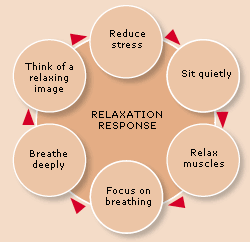Physical relaxation techniques can help you to reduce
muscle tension and manage the effects on your body of the
fight-or-flight response. This can be particularly important if you need
to think clearly and perform.
Breathe Deeply
Deep breathing is a
simple, but very effective, method of relaxation, and it is a core
component of everything from the “take ten deep breaths” approach to
calming someone down, right through to yoga relaxation and Zen
meditation. It works well in conjunction with other relaxation
techniques such as progressive muscular relaxation (see Discover Progressive Muscular Relaxation),
relaxation imagery, and meditation to reduce stress. To use the
technique, simply take a number of deep breaths and relax your body
further with each breath. That’s all there is to it, but it works!
Learn Mental and Physical Control Techniques
The use of bio-feedback
technology will help you in this, but even just taking your pulse will
help you to gauge how stressed you are, and you can learn to
deliberately raise and lower your heartbeat by, for example, imagining
stressful and restful situations alternately. These techniques will make
you more aware of when stress is having an effect on you, and enable
you to take conscious steps to calm yourself down.
5 Minute Fix
If you need to release stress-induced neck tension quickly, repeat this simple exercise 5–10 times.
Sit in a comfortable position and close your eyes.
Bring your shoulders up to your ears.
Hold the position for five seconds.
Relax slowly into your starting position.
Discover Progressive Muscular Relaxation
In a series of experiments into various forms of
meditation in the 1960s, Dr Herbert Benson of Harvard University
established that this technique really does help to reduce stress and
control the fight-or-flight response.
The technique is
essentially the same as meditation, but it focuses on the physical
effects. These physical effects include deep relaxation, slowed
heartbeat and breathing, reduced oxygen consumption, and increased skin
resistance.
Sit quietly and comfortably, and close your eyes.
Start by relaxing the muscles of your feet and then work your way up your body, relaxing the muscles in sequence.
Focus your attention on your breathing.
Breathe in deeply and then let your breath out.
Count your breaths, and say the number of each breath as you let it out.
Continue doing this for between ten and 20 minutes.
An even more potent approach is to follow these steps, but to use relaxation imagery instead of counting breaths.

Tip
Use these relaxation techniques whenever you need to perform well under pressure.